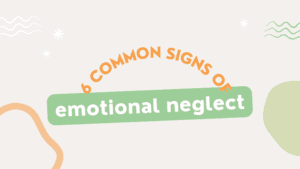Disclaimer: While we will be talking about the topic of neglect in today’s article, please know that this article is aimed for adults who have experienced emotional neglect growing up, or presently with a romantic partner. If you suspect a minor you know is being neglected emotionally or physically, please contact a therapist, mandated reporter, child protective services, or your local authorities if the minor is in immediate danger.
What is Emotional Neglect
Emotional neglect happens when a person’s feelings are ignored or dismissed by a significant person in their life. Most often, this is a parent or a romantic partner. However, the other person can fulfil another role, such as grandparent, legal guardian, or close friend.
A person who experiences emotional neglect will often face multiple signs and symptoms that indicate that they have experienced disconnection and neglect. In today’s article, we are going to review six common signs of emotional neglect. Afterwards, we will discuss four strategies you can begin to implement today to assist with the symptoms of emotional neglect.

While this list covers some of the most common symptoms of emotional neglect, please note that emotional neglect can appear with variation in everyone. If you believe that you or someone you know has or is experiencing emotional neglect, please connect with a trained provider to assist with providing a diagnosis and collaborating on a treatment plan.
Feeling Numb
Feeling numb occurs when a person has a hard time not only expressing, but also feeling the emotions they are going through. Someone who is feeling numb may look highly introverted, disengaged, or distracted. Additionally, someone who is experiencing emotional numbness may not contribute much in conversations or openly express how they feel.
Feeling numb is a result of lowered self-esteem and fear of rejection that comes with emotional neglect. If a person believes their feelings or perspective is “not worthy” of another person’s time, they may shut down as a way to cope with those feelings.
Being Discouraged Easily
A person who is often dismissed, ignored, or disregarded due to emotional neglect is more likely to become discouraged easily. Think about it this way: image you feel passionate about a topic and want to talk to someone else about it. If that other person dismissed you, one emotion you may feel is discouraged. Constant feelings of discouragement can cause one to diminish accomplishments and minimize their worth.
Rejection Sensitivity
Like feeling numb, if a person experiences emotional neglect, they may perceive the term “no” or other forms of denying as a sign of rejection. Feeling numb, as previously mentioned, is just one outcome as a result of rejection. Other emotions that may follow rejection include grief, lowered self-esteem, irritability, and anger.
If you or someone you know has experienced emotional neglect, then that person may take rejection as a very personal experience. It is important to note this symptom is not a character flaw of the person who has endured emotional neglect, but rather, a deep mark that the neglect has left on the person.
Perfectionism
For some, emotional neglect can result in perfectionism as a way to please others and gain respect and/or acceptance. By doing things perfectly, a person who has endured emotional neglect may feel they will be taken seriously once again.
While this may be a thought trap, it is also important to note that perfectionism can also lead to overwhelm and burnout. If you experienced emotional neglect and find yourself leaning towards perfectionism, it is important to prioritize self-care and make sure you are not getting burnt out.
Guilt and Shame
As previously mentioned, emotional neglect often has deep impacts on our self-esteem. When this occurs, one may have thoughts of guilt and shame. For example, one may feel guilty or embarrassed for having an opinion or experiencing an emotion for fear that the opinion or emotion will be dismissed or be considered unimportant.
Difficulty Naming Emotions
The last symptom that we want to cover in today’s article is finding it difficult to name emotions. When a person is taught to suppress their feelings, or that their feelings are not important enough, a person may no longer prioritize expressing themselves. This can lead to a disconnect between feeling an emotion and articulating it to others.
What You Can Do
If you or someone you know has experience emotional neglect, know that there are things you can do to assist with the signs and symptoms of neglect. We are now going to outline four practices you can incorporate immediately if you have experienced emotional neglect, either growing up, or in adulthood.
1. Don’t Blame Yourself
While it may “feel easy” at first to think that you have some responsibility in other people not taking your thoughts and feelings serious (raise your hand if you were taught you were “too sensitive”), know it is not your fault.
Showing emotion and forming your own thoughts and opinions are important for your personal growth and emotional development. When other people stifle you from expressing those thoughts and feelings, they are negatively impacting your emotional growth and experience. Sure, someone else may need time and to be in the right headspace to receive someone else’s emotions, but these conversations should not be stopped altogether or dismissed.
2. Practice Self-Esteem Exercises
Finding ways to boost your self-esteem after experiencing emotional neglect is important. You need to remind yourself that you ARE worthy and your feelings and thoughts matter. Say it. In the mirror, write it out, and remind yourself multiple times a day. Keep affirming your perspective’s worth until you begin to believe it in your heart.
3. Surround Yourself With Positivity
First thing is first: remove the energy vampires. Of course, this is easy said not easy done. Sometimes, we experience emotional neglect from people who we also care about and want to give and receive love. When this happens, we need to begin to set boundaries in place.
A great way to start is to introduce more positive people, follow more positive accounts, and watch more positive content in our lives. That way, we are adding more positivity into our daily routine.
4. Talk it Out Someone
Talking about your experiences and learning how to identify green and red flags is a great way to recover from emotional neglect. While having a person you trust that you can speak with is fantastic, it is also important to learn these skills from someone neutral and trained in identifying them.
Starting Therapy
Here at online-therapy . com we can offer you just that. We have therapists trained in identifying neglect and collaborating on ways to manage its symptoms to promote healthy living in adulthood.




Leave A Comment